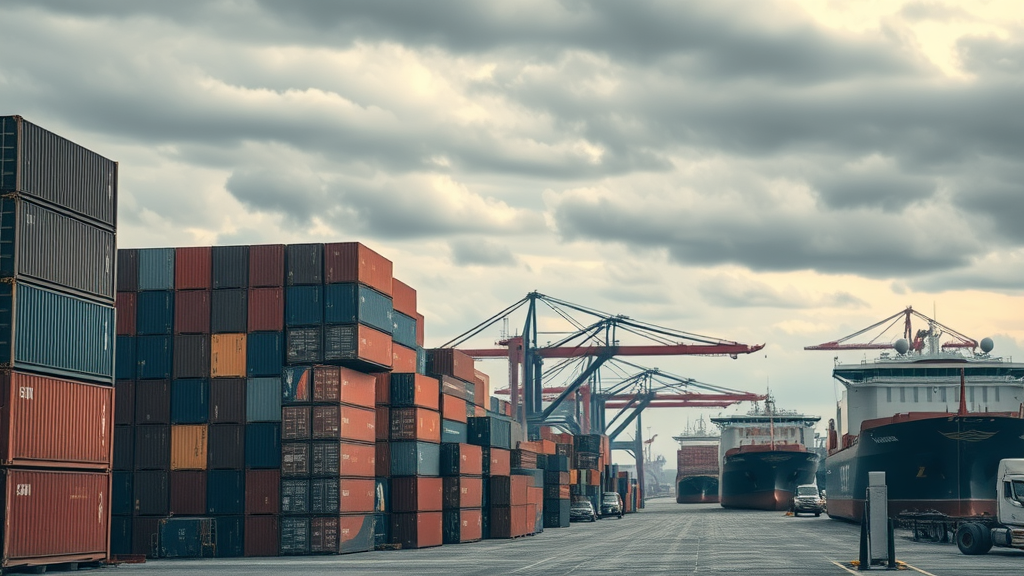
Did you know that less than 20% of applicants pass the customs broker license exam on their first try ? That’s a shocking figure, especially as international trade drives record demand for licensed customs brokers. If you’re thinking the process to get your customs broker license is daunting or out of reach, think again — with the right approach, you can fast-track your path and join this in-demand trade community. This clear and detailed guide will walk you through how to get a custom broker license quickly, avoiding common pitfalls and highlighting steps others often miss.
How to Get a Custom Broker License: Surprising Facts and The Accelerated Path
- Did you know less than 20% of applicants pass the customs broker license exam on their first try?
- With international trade on the rise, demand for licensed customs brokers is at a record high.
- Custom broker licensing is more accessible than you might think.
Pursuing a customs broker license can seem overwhelming, especially when facing the notorious broker license exam. Surprisingly, despite the challenging reputation, the actual process is more accessible and streamlined than many assume—if you know the right steps to follow. Applicants often underestimate how straightforward how to get a custom broker license can be when they take a proactive approach to studying and paperwork.
With global commerce rapidly expanding, the United States government is actively seeking dedicated professionals to help importers and exporters meet federal requirements governing trade. Licensed customs brokers play an essential role in ensuring proper entry procedures, compliance with customs and border protection regulations, and correctness in fee calculations for imported merchandise based on the harmonized tariff schedule. Knowing these facts, it's clear that the opportunity to become a licensed customs broker is both valuable and reachable.
Understanding the Role of a Customs Broker and Why a Broker License Matters
Before you dive into how to get a custom broker license , it’s essential to understand why customs brokers are a cornerstone in the movement of goods across U.S. borders. They are much more than paperwork processors—they’re trusted advisors who manage legal compliance, support international business, and play a critical part in the nation’s economic activity. The customs broker license gives you the legal authority to transact customs business, making you indispensable to importers and exporters navigating complex shipping, tariffs, and regulations.
The path to becoming a licensed customs broker includes mastering U.S. trade laws, border protection policies, and fee structures for imported merchandise. Walking this path successfully positions you as an expert, working closely with CBP (Customs and Border Protection) to help companies thrive in global markets. As global trade grows, more businesses need skilled customs brokers who can simplify import/export processes and help them steer clear of costly compliance issues.
What Does a Customs Broker Do? Key Responsibilities and Opportunities
- Facilitate import and export documentation
- Ensure legal compliance with border regulations
- Act as a liaison between importers, exporters, and government agencies
Brokers must have expertise in the entry procedures for all types of merchandise, using the harmonized tariff schedule and CBP form requirements to guide their work. The customs broker role opens doors to career opportunities across international logistics, consulting, and regulatory compliance. Many customs brokers create long-term careers by building specialized knowledge and strong relationships with U.S. Customs and Border Protection, importers, and exporters in meeting federal requirements.

Step-by-Step Guide: How to Get a Custom Broker License Quickly
Ready to start your journey? Here’s a practical, step-by-step roadmap on how to get a custom broker license fast and easy . This section breaks down eligibility, exam preparation, application procedures, and insider tips to accelerate your results.
Eligibility Criteria for a Customs Broker License
- Be at least 21 years old
- Be a U.S. citizen
- Have no felony convictions
- Pass the CBLE (Customs Broker License Exam)
- Submit the required application and fees
Eligibility to become a customs broker in the United States starts with these fundamental requirements, as specified by U.S. Customs and Border Protection . Applicants must be of legal age, demonstrate good character (with no felony convictions), and showcase their expertise by passing the rigorous broker license exam. Beyond these basics, applicants must also present evidence of citizenship and satisfy all relevant government documentation and background checks.
The CBLE, or Customs Broker License Exam, schedules its notice of examination only twice per year, so planning ahead is key. Take care to review the specific application instructions and deadlines listed on the official cbp.gov website or similar gov website resources to ensure you don’t miss a step in the eligibility process — missing deadlines is one of the most common mistakes for new applicants.
Tips to Fast-Track Your Success: Preparing for the Customs Broker License Exam
- Enroll in a comprehensive prep course
- Study past exam questions
- Practice time management for exam day
The customs broker license exam is notorious for its complexity, covering entry procedures, tariff schedules, and regulations from the CBP. To maximize your chances of obtaining a passing grade, enroll in an accredited customs broker prep course . These courses offer practice exams and review the harmonized tariff schedule, import/export documentation, and commonly tested cbp form processes. Reviewing past exam materials and government guidelines gives you concrete familiarity with question formats and recurring topics.
Effective time management is a major success factor. The CBLE can feel overwhelming with its intense time limits and broad coverage, but practicing realistic sample tests and mock exams will help you manage stress and avoid careless mistakes on exam day. Leveraging insights from people who have already passed the exam can further sharpen your study plan and help you focus on likely tested areas.

Submitting Your Broker License Application: Documents and Deadlines
| Step | Action | Estimated Time |
|---|---|---|
| 1 | Check Requirements | 1 day |
| 2 | Register for Exam | Variable |
| 3 | Prepare for Exam | 1-3 months |
| 4 | Take Exam | Fixed Date |
| 5 | Submit Application | 1 week |
| 6 | Background Check | 1-2 months |
After passing the exam, submit your complete application (typically via CBP Form 3124E ) to your local port director. The application process is not just about paperwork — it’s about meeting all legal requirements, providing supporting identification, and promptly responding to any inquiries from border protection officials. Following the prescribed timeline and double-checking your documents can make the difference for swift approval.
Most delays happen due to incomplete forms or missing documents. Use the CBP website for the latest checklists, and keep copies of everything you submit. After submission, expect a background check and verification process, which can take a few months to complete, depending on the volume and complexity of applications at your chosen port.
Common Mistakes to Avoid When Applying for a Customs Broker License
- Missing application deadlines
- Incomplete paperwork
- Insufficient exam prep
Don’t let small mistakes undermine your goal to become a licensed customs broker . Missing the application deadline or forgetting required paperwork can set you back a full exam cycle (often six months or more). Always consult the gov website for recent regulatory updates, and consider connecting with customs broker associations to gather relevant information and resources.
Another frequent mistake is underestimating the amount of study required for the customs broker license exam . This exam covers everything from harmonized tariff schedule details to the nuances of trade compliance and federal requirements. Devoting enough time and using practice questions boosts your chance of earning a passing grade.
"Taking the time to properly prepare your application and study for the exam can mean the difference between success and frustration." — Senior Licensed Customs Broker
Commonly Asked Questions on How to Get a Custom Broker License
How do I get a customs broker license?
To get a customs broker license, you'll need to meet the eligibility criteria, pass the CBLE, and submit your application to U.S. Customs and Border Protection. Preparation and attention to detail are key to your success.

What does it take to be a customs broker?
Becoming a customs broker requires strong attention to detail, understanding of government regulations, and the ability to navigate complex compliance requirements. Passing the exam demonstrates your expertise.
How much does it cost to get a customs broker?
Exam fees, prep courses, and application costs typically range from $400 to $1,000, depending on your study materials and resources.
How much do licensed customs brokers make in the US?
Licensed customs brokers can earn between $50,000 and $120,000 annually, depending on their experience, specialty, and location within the United States.

Expert Strategies and Additional Information for Succeeding as a Customs Broker
Achieving your customs broker license is just the beginning—true success comes from staying current, building relationships, and continuing your education within the customs business . Here’s what top professionals recommend to thrive in your new career and stay compliant as regulations change.
Staying Compliant: Continuing Education for Customs Brokers
- Attend annual training sessions
- Join customs broker associations
- Stay updated with regulatory changes
Regulations from Customs and Border Protection are regularly updated, so customs brokers must commit to lifelong learning. Attend annual workshops, trade law seminars, and certifications offered by professional associations or through the CBP website . Regular training ensures you remain compliant with evolving legal expectations and maintain your license validity.
Staying informed on changes to the harmonized tariff schedule, entry procedures, and trade agreements will help you serve your clients confidently and avoid costly compliance errors. This sets you apart and makes you more valuable to your clients and employers in the customs broker industry.
Career Growth and Networking in the Customs Broker Industry
- Connect with global trade professionals
- Participate in industry conferences
- Leverage digital platforms for learning
Networking is a game-changer for customs brokers looking to grow their careers. Attend conferences, trade shows, and webinars hosted by the National Customs Brokers & Forwarders Association of America or similar bodies. Engaging with peers creates opportunities to learn about regulatory changes, best practices, and new business models that drive innovation in the industry.
Don’t underestimate online resources—forums, LinkedIn groups, and dedicated trade compliance communities are rich with relevant information, offering solutions to real-world challenges that customs brokers face every day. This ongoing engagement provides valuable additional information and insights for your career trajectory.
Resources for Ongoing Support and Additional Information
- U.S. Customs and Border Protection website
- Accredited customs broker training programs
- National Customs Brokers & Forwarders Association of America
The CBP website is the definitive resource for the latest regulations, exam dates, and forms for all customs brokers. Supplement your knowledge through accredited training programs and by joining respected trade organizations, all of which provide additional information and support for every stage of your broker career.

Key Points Recap: How to Get a Custom Broker License in Record Time
- Meet eligibility requirements
- Master the customs broker exam
- Submit a complete broker license application
- Take advantage of additional information and training resources
Ready to Advance Your Career as a Licensed Customs Broker?
Have insights to share on global trade? Let's talk—call us at 203-271-7991 to explore contributing an article.
To expedite your journey toward becoming a licensed customs broker, it’s essential to understand the process and leverage available resources. The U.S. Customs and Border Protection (CBP) provides a comprehensive guide titled “Becoming a Customs Broker,” which outlines the eligibility criteria, examination details, and application procedures. This resource is invaluable for grasping the foundational steps required to obtain your license. ( cbp.gov )
Given the challenging nature of the Customs Broker License Examination (CBLE), enrolling in a specialized preparation course can significantly enhance your chances of success. The “Customs Broker License Exam Preparation” course offered by DB Schenker Trade Solutions provides extensive training through practice questions and simulated exams, aiming to equip candidates with the necessary knowledge and test-taking strategies. ( ts.dbschenker.com )
By utilizing these authoritative resources, you can streamline your path to becoming a licensed customs broker, ensuring you meet all requirements efficiently and effectively.
 Add Row
Add Row  Add
Add 




Write A Comment